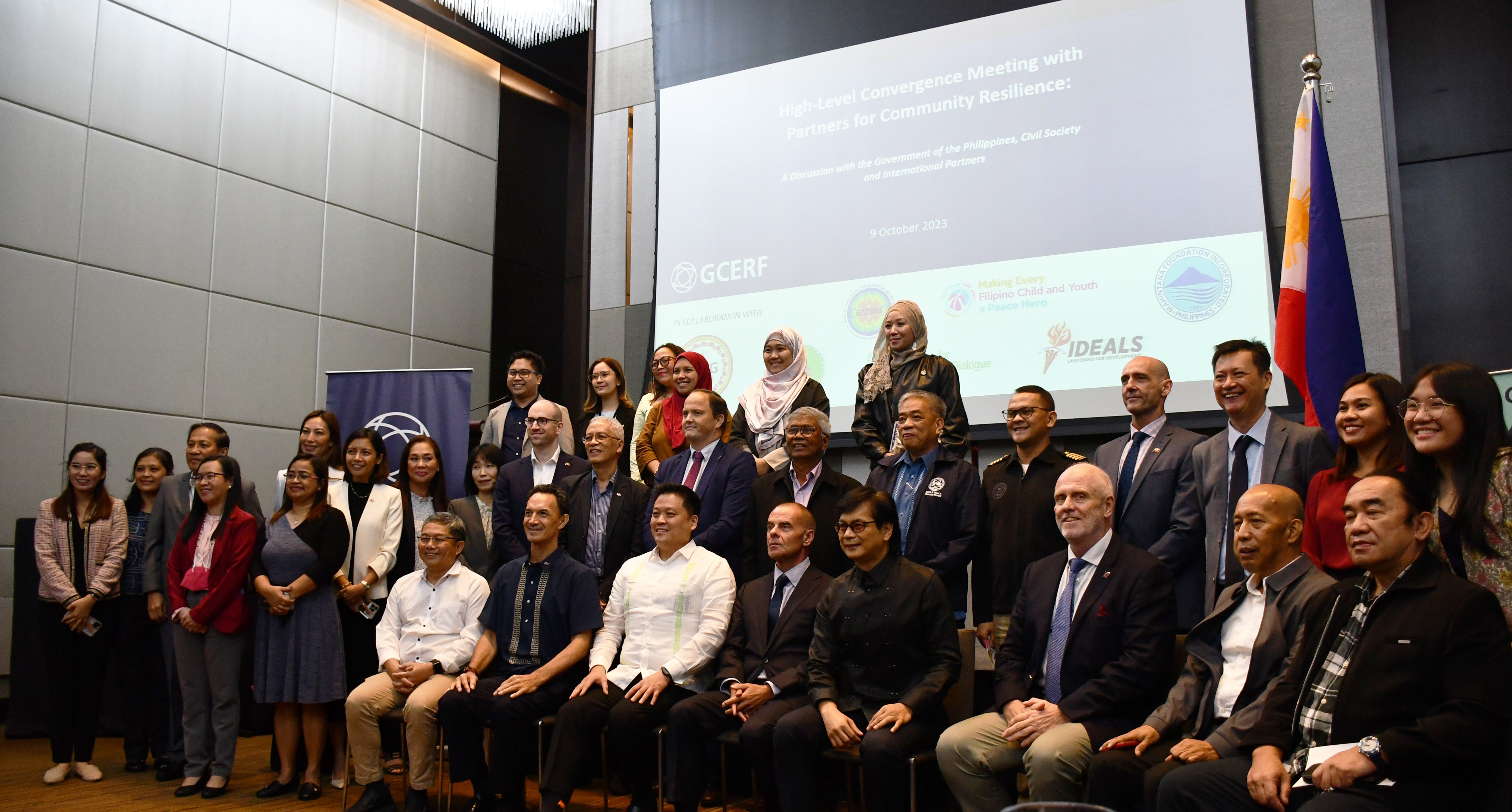GCERF Convenes Government, Civil Society and Donor Representatives for a High-Level Convergence Event on Prevention of Violent Extremism in the Philippines
GCERF Convenes Government, Civil Society and Donor Representatives for a High-Level Convergence Event on Prevention of Violent Extremism in the Philippines

GCERF Convenes Government, Civil Society and Donor Representatives for a High-Level Convergence Event on Prevention of Violent Extremism in the Philippines
Manila, 09 October 2023: In a first-of-its-kind Convergence Event, GCERF convened senior leadership of the Government of the Philippines, heads of GCERF’s six current civil society implementing partners and representatives of five donor governments, for a dynamic exchange of perspectives on preventing violent extremism in the Philippines.
Held in Makati City, Manila, high-level participants included Department of Interior and Local Government (DILG) Secretary Benjamin Abalos, Department of Social Welfare and Development (DSWD) Secretary Rex Gatchalian, and Department of National Defence (DND) Secretary Gilbert Teodoro.
In opening remarks, GCERF’s Executive Director Dr Khalid Koser highlighted that the event was the first time since the organisation began investing in grants to the Philippines in 2019 that it had the opportunity to convene senior leadership of both government and civil society partners for such a dialogue, and to receive input from donors as well.
“Today’s event is a chance for our civil society partners to present progress as well as challenges, and for us collectively to identify future priorities through constructive discussion,” he said. “We are seeing that peace is a precious commodity; the Philippines has a unique peace process, and we as GCERF are here to learn from and support you.”
“We are coming together to address a concern that affects the safety, security and resilience of the Philippines,” said Secretary Benjamin Abalos of DILG, addressing the audience. I want to underscore the importance of our ‘whole of nation’ approach. Preventing violent extremism calls for a collective effort by all sectors of society,” he said.
Department of Social Welfare and Development Secretary Rex Gatchalian noted alignment between his department’s approach and the perspectives of NGO participants in the meeting: “Communities know what they need. We work with civil society groups because we need them to facilitate the dialogue with the community stakeholders,” he said. We also need local government to be a counterpart; their governance and owndership is key.”
Presenting their work, the six heads of GCERF’s civil society partners highlighted positive engagement of the communities where they are working to implement a wide array of community-led projects to engage with religious leadership, Internally Displaced Persons impacted by the Marawi Seige, former combatants and their families, military personnel, youth and children reached with peace education, trainees for communications and advocacy empowerment, and more.
They also flagged challenges facing the communities in which they work: Among others, the concerns raised included insecurity linked to land rights, the need for adequate resourcing for the Marawi Compensation Board, and lack of livelihoods among at-risk communities—a particular challenge for youth creating risk of extremist recruitment.
The instrumental role of communities themselves in identifying and owning solutions was a refrain echoed by the Principal Recipient leadership, representing the Consortium of Bangsamoro Civil Society (CBCS), Ecosystems Work for Essential Benefits (ECOWEB), Ideals, Initiatives for International Dialogue (IID), Mahintana Foundation, and the Teach Peace Build Peace Movement (TPBPM).
Since 2019, GCERF has supported more than 40 civil society partners in the Philippines to implement projects that have reached more than 200,000 direct participants, and some two million families and communities of those participants reached indirectly through the programmes. With USD 8.5 million invested since 2019, current projects supported by three-year grants are active in Mindanao and Metro Manila.
As a global fund making grants to prevent violent extremism in 22 countries, GCERF has to date committed approximately USD 22 million in donor funds to the Asia-Pacific region, representing nearly 30% of GCERF’s portfolio since GCERF began making grants in 2017. Regionally, these investments have directly engaged more than one million people in initiatives to prevent extremist recruitment and to promote tolerance and peace. Millions more have been reached through the positive impact on at-risk communities in the three countries since the earliest grants were signed in 2015.
ENDS
Based in Geneva, Switzerland, GCERF is a global fund making grants to support community-led projects in countries where the risk of violent extremism is high. GCERF supports more than 277 civil society partners around the world with grants of an initial duration of three years. Projects supported by GCERF aim to reach vulnerable individuals and communities, equipping them to be better able to counter violent extremist rhetoric and efforts to recruit new members.
The new grants will build in features to ensure continuity beyond the period where the countries receive GCERF funding. Long-term sustainability of community-led initiatives is a key feature of all GCERF grants. To date, projects supported by GCERF have reached more than three million people directly at risk of radicalisation and recruitment, at an average cost of only USD 39 per person.
To see where GCERF works please visit: GCERF Map
To learn more about GCERF please visit: www.gcerf.org
Media contacts:
r.vanek@gcerf.org/ s.konda@gcerf.org/ media@gcerf.org
